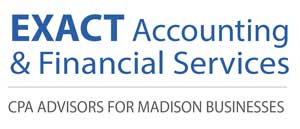Business Start Up Tips
Exact Accounting & Financial Services • January 8, 2021
Are you a Wisconsin business startup?

Check out these great business startup tips for suggestions and links to helpful items to get you moving in the right direction.
- Determine your readiness to start your own business.
What product(s) or service(s) will you sell/provide? Who are your customers? Your CPA is a trained adviser and will be eager to discuss your skills, experience, business ideas and goals. You can also find a list of questions to ask before starting your business at the U.S. Department of Commerce’s Minority Business Development Agency website. - Address the essentials. Creating a business plan, finding office space and setting up your business name with local and state regulators are just a few of the activities you’ll need to address when starting your business. Your Exact Accounting CPA can help you determine what your small business budget will allow. Read SBA's 1 0 Steps to Start Your Business.
- Define your market. Knowing what businesses or individuals will need your product or service is an important part of success. Do market research competitive analysis to understand your market, and which data to help you find it. \
- Understand current economic conditions that could contribute to or hinder your success.Your CPA stays abreast of the frequent market fluctuations that can affect your business’ success.
- Select your business location and identify necessary equipment and required technology. Understanding how your business’ location matters, and what business equipment you need to make it run is essential. The SBA offers guides for choosing a location and equipping it appropriately. Your CPA will be able to give you valuable advice about the desirability of leases and other office space options.
- Determine your staffing needs and understand related employment laws. If you need to hire employees or contractors, you’ll want to define their functions and understand the laws that govern their employment. Your CPA will understand regulatory compliance in the state where you do business.
- Determine your business structure and related legal, business and tax implications
. There are different legal definitions for businesses. You’ll need to take different steps depending on the type you choose for your business. A CPA is instrumental in helping you find the business structure that will work best for your particular circumstances. The SBA has a great resource on choosing business structure types.
- Make a business plan
.
When you’ve investigated your market, set pricing and made projections about your income and expenses, it’s time to make a startup business plan. Your CPA can help you make sense of budgets, profit and loss statements, and an assortment of best practices in keeping your business’ finances current.
- Join associations, trade groups and chambers of commerce . Keeping up with your vendors and other professionals in your business is just as important as keeping up with your clients. Stay abreast of what’s happening in your area, and take advantage of opportunities to learn from others.
- Project your personal financial needs. As a business owner (especially a new business), your business and personal finances will be closely related. Your personal needs and expenses should be considered when determining how you need your business to perform. A CPA knows the best ways to draw up a personal budget and monitor your expenses.
- Determine startup costs and operating capital and, if necessary, make financing arrangements . You’ll need funds to establish an office, equip it, possibly hire employees, and more. You’ll also want sufficient capital to pay your business’ expenses from month to month. Your CPA will be able to help create your startup business operating budget.

